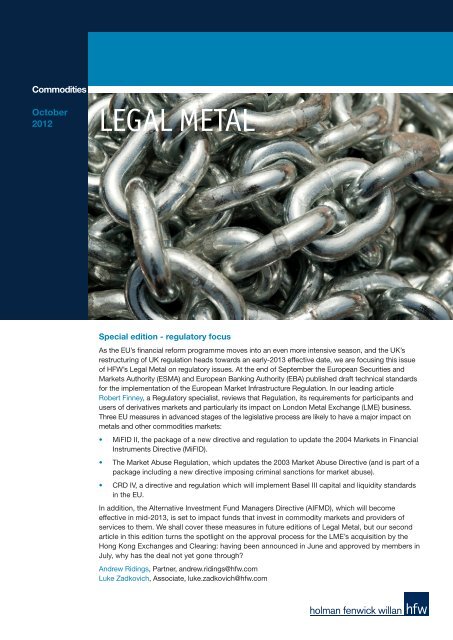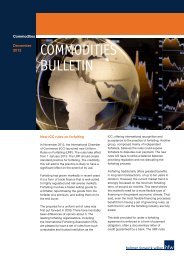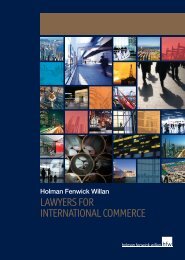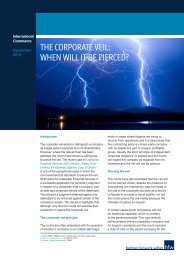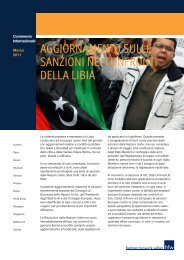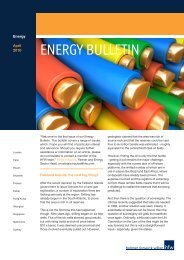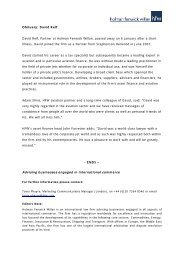LEGAL METAL - Holman Fenwick Willan
LEGAL METAL - Holman Fenwick Willan
LEGAL METAL - Holman Fenwick Willan
You also want an ePaper? Increase the reach of your titles
YUMPU automatically turns print PDFs into web optimized ePapers that Google loves.
Commodities<br />
October<br />
2012<br />
<strong>LEGAL</strong> <strong>METAL</strong><br />
Special edition - regulatory focus<br />
As the EU’s financial reform programme moves into an even more intensive season, and the UK’s<br />
restructuring of UK regulation heads towards an early-2013 effective date, we are focusing this issue<br />
of HFW’s Legal Metal on regulatory issues. At the end of September the European Securities and<br />
Markets Authority (ESMA) and European Banking Authority (EBA) published draft technical standards<br />
for the implementation of the European Market Infrastructure Regulation. In our leading article<br />
Robert Finney, a Regulatory specialist, reviews that Regulation, its requirements for participants and<br />
users of derivatives markets and particularly its impact on London Metal Exchange (LME) business.<br />
Three EU measures in advanced stages of the legislative process are likely to have a major impact on<br />
metals and other commodities markets:<br />
• MiFID II, the package of a new directive and regulation to update the 2004 Markets in Financial<br />
Instruments Directive (MiFID).<br />
• The Market Abuse Regulation, which updates the 2003 Market Abuse Directive (and is part of a<br />
package including a new directive imposing criminal sanctions for market abuse).<br />
• CRD IV, a directive and regulation which will implement Basel III capital and liquidity standards<br />
in the EU.<br />
In addition, the Alternative Investment Fund Managers Directive (AIFMD), which will become<br />
effective in mid-2013, is set to impact funds that invest in commodity markets and providers of<br />
services to them. We shall cover these measures in future editions of Legal Metal, but our second<br />
article in this edition turns the spotlight on the approval process for the LME’s acquisition by the<br />
Hong Kong Exchanges and Clearing: having been announced in June and approved by members in<br />
July, why has the deal not yet gone through?<br />
Andrew Ridings, Partner, andrew.ridings@hfw.com<br />
Luke Zadkovich, Associate, luke.zadkovich@hfw.com
EU’s OTC Derivatives<br />
Regulation impacts LME<br />
business<br />
In July 2012, the Council of the<br />
European Union finally adopted the<br />
Regulation on OTC derivatives, central<br />
counterparties and trade repositories,<br />
commonly known as the European<br />
Market Infrastructure Regulation<br />
(EMIR). Members and users of the<br />
LME will be affected. Robert Finney<br />
and David Chalcraft take a look at the<br />
main provisions of EMIR and consider<br />
some of its potential impacts.<br />
EMIR has arisen from concerns about<br />
risk and lack of transparency in Overthe-Counter<br />
(OTC) derivative markets.<br />
In the financial crisis it was perceived<br />
that OTC derivatives contracts<br />
played a significant role in the near<br />
collapse of Bear Stearns and AIG and<br />
the failure of Lehman Brothers, yet<br />
little information on the market was<br />
available publicly or to regulators. In<br />
the absence of central counterparties<br />
(CCPs), market counterparties were to<br />
a degree interdependent, giving rise<br />
to a risk of global financial instability.<br />
CCPs are interposed between parties<br />
to contracts traded on one or more<br />
markets, becoming “the buyer to<br />
every seller and the seller to every<br />
buyer”. By replacing parties’ credit<br />
exposure on each transaction CCPs<br />
insulate market participants from each<br />
other - even if the consequence is<br />
that CCPs’ own systemic importance<br />
increases and some become “too-bigto-fail”<br />
institutions.<br />
The world’s leading economies<br />
recognised the need to reduce<br />
financial instability, and a consensus<br />
in favour of a series of risk mitigation<br />
measures was reached at the 2009<br />
G20 summit in Pittsburgh:<br />
02 Legal Metal<br />
• All standard derivatives contracts<br />
should be cleared through CCPs<br />
by end-2012 at the latest.<br />
• They should be traded on<br />
exchanges or electronic trading<br />
platforms, where appropriate.<br />
• OTC derivative contracts should<br />
be reported to trade repositories.<br />
• Non-centrally cleared contracts<br />
should be subject to higher<br />
capital requirements.<br />
EMIR seeks to establish the<br />
framework to achieve this in the<br />
European Economic Area (EEA), and<br />
to meet other objectives such as<br />
reducing risk and setting standards for<br />
trade repositories (TRs) and CCPs.<br />
EMIR entered into force in mid-<br />
August 2012 but its reporting and<br />
clearing obligations seem unlikely<br />
to become effective until mid-<br />
2013. Meanwhile, implementing<br />
measures are being developed by<br />
the European Supervisory Authorities<br />
and will be submitted to the European<br />
Commission (the Commission) for<br />
adoption.<br />
EMIR’s substantive requirements<br />
Clearing and reporting<br />
1. Clearing of certain standardised<br />
OTC derivatives contracts<br />
through CCPs where the parties<br />
are financial entities or are<br />
non-financial firms whose OTC<br />
derivatives positions exceed a set<br />
clearing threshold (NFCs+). The<br />
clearing threshold is described in<br />
more detail below.<br />
2. Reporting of all derivatives<br />
contracts to trade repositories<br />
without duplication and (1)<br />
whether or not cleared through<br />
a CCP, and (2) whether traded<br />
OTC or on an exchange (or other<br />
organised platform).<br />
A trade repository is a fairly new<br />
type of commercial organisation<br />
responsible for collating and<br />
managing records of OTC derivatives<br />
contracts. EMIR imposes detailed<br />
reporting requirements upon trade<br />
repositories. The European Securities<br />
and Markets Authority (ESMA) will be<br />
responsible for overseeing them.<br />
Which contracts must be cleared?<br />
OTC derivatives, for the purposes<br />
of EMIR, are those not traded on<br />
markets which are regulated markets<br />
or equivalent non-EEA markets<br />
under the EU’s Markets in Financial<br />
Instruments Directive (MiFID). Not<br />
all OTC derivatives will be subject to<br />
mandatory clearing through a CCP:<br />
• EMIR applies only to derivatives<br />
within the scope of MiFID or, in<br />
due course, the new legislation<br />
which is due to reform and<br />
replace MiFID (MiFID II). Most<br />
notably, physically-settled<br />
currency forwards are generally<br />
excluded.<br />
• Other than the reporting<br />
obligation, EMIR is generally<br />
disapplied in relation to certain<br />
types of counterparty (mostly<br />
central banks and bodies<br />
responsible for public debt<br />
management).<br />
• As indicated above, a contract<br />
with a non-financial counterparty<br />
(NFC) below the clearing<br />
threshold need not be cleared.
• Certain intra-group transactions<br />
will be exempt from clearing.<br />
• EMIR contains complex<br />
provisions regulating the<br />
circumstances in which contracts<br />
with entities established outside<br />
the EU must be cleared.<br />
• Only classes of derivatives<br />
specified in regulations adopted<br />
by the Commission (on ESMA’s<br />
advice, after public consultation)<br />
will be subject to mandatory<br />
clearing. Once CCPs are formally<br />
authorised for the purposes<br />
of EMIR (in mid-2013), ESMA<br />
will consider which of the OTC<br />
derivatives cleared by them<br />
should be designated for clearing.<br />
A clearing recommendation<br />
will be based on the degree of<br />
standardisation of contract terms<br />
and operational processes for the<br />
relevant class of OTC derivatives,<br />
the degree of liquidity, and the<br />
availability and quality of pricing<br />
information.<br />
Indirect clearing and reporting<br />
Counterparties can delegate reporting<br />
- for example, an NFC could agree<br />
that its financial counterparty (“FC”)<br />
on a trade reports that trade or, if<br />
the trade is cleared, that the relevant<br />
CCP or CCP clearing member reports<br />
it. However, the arrangements must<br />
avoid duplicative reporting.<br />
In addition to clearing as a clearing<br />
member or a clearing member’s<br />
client, EMIR made provision for<br />
a new concept, namely indirect<br />
clearing arrangements with a clearing<br />
member. These are interpreted by<br />
ESMA as covering situations where<br />
a clearing member’s client is in turn<br />
providing clearing services to “indirect<br />
clients”. Such arrangements must<br />
achieve equivalent protection of the<br />
counterparty’s positions and assets,<br />
and not increase counterparty risk.<br />
ESMA has recommended a range of<br />
specific obligations be imposed on<br />
CCPs, clearing members and direct<br />
clients to achieve this – one of the<br />
more controversial areas of ESMA’s<br />
proposals.<br />
Mitigation of risk<br />
Strict risk management requirements,<br />
including initial and variation margin,<br />
will apply to derivatives which are not<br />
cleared. Contracts may be uncleared<br />
because the contract is ineligible for<br />
mandatory clearing or because a party<br />
is not subject to the clearing obligation.<br />
Both FCs (such as banks, investment<br />
firms, investment funds and insurers)<br />
and NFCs must implement robust<br />
procedures to measure, monitor and<br />
mitigate credit and operational risk in<br />
accordance with detailed technical<br />
standards. The Commission will adopt<br />
these on the basis of drafts submitted<br />
by ESMA or jointly by the European<br />
Supervisory Authorities (ESAs), ESMA<br />
and the banking and insurance/<br />
pensions authorities.<br />
Last month ESMA published draft<br />
regulations in respect of:<br />
• Prompt confirmation of<br />
transactions.<br />
• Regular revaluation (generally,<br />
daily and through marking-tomarket).<br />
• Regular reconciliation of portfolios<br />
and portfolio compression<br />
reviews.<br />
• Agreed dispute resolution<br />
procedures.<br />
Consultation on the ESA drafts will<br />
include:<br />
• Risk management arrangements<br />
for FCs and NFCs+, in particular:<br />
- Regular exchange of variation<br />
margin or collateral and<br />
(probably) posting of initial<br />
margin.<br />
- Levels and types of collateral.<br />
- Segregation arrangements for<br />
margin and collateral.<br />
• The extent to which any (or any<br />
additional) capital requirements<br />
should be imposed on FCs to<br />
cover uncollateralised risks.<br />
• The criteria and procedures<br />
for the various intra-group<br />
exemptions from collateralisation<br />
requirements.<br />
Intra-group transactions, though<br />
generally not subject to mandatory<br />
clearing, will be subject to<br />
collateralisation unless there is “no<br />
current or foreseen practical or legal<br />
impediment to the prompt transfer of<br />
own funds or repayment of liabilities<br />
between counterparties”. While<br />
EMIR contains detailed and complex<br />
requirements and exemptions on this,<br />
certain aspects are still to be fleshed<br />
out in technical standards.<br />
The ESAs issued a discussion paper<br />
on the details last March. However,<br />
consultation on these joint draft<br />
regulatory technical standards has<br />
been delayed to enable EU rules to be<br />
consistent with global standards being<br />
developed by the Basel Committee<br />
on Banking Supervision (BCBS) and<br />
the International Organization of<br />
Securities Commissions (IOSCO).<br />
Legal Metal 03
Those standards are expected to be<br />
delivered by the end of 2012, so the<br />
EU public consultation is likely to be<br />
conducted in the first half of 2013.<br />
Third countries<br />
EMIR will have wide extra-territorial<br />
effect.<br />
The clearing obligation will apply<br />
to contracts with third country<br />
counterparties (TCCs) in each of the<br />
following situations:<br />
1. Where EU-established FCs<br />
or NFCs+ transact with TCCs<br />
who would be caught by the<br />
clearing requirement if they were<br />
established in the EU.<br />
2. Where two TCCs transact and<br />
(1) both would be subject to the<br />
clearing requirement if they were<br />
EU established and (2) either the<br />
contract has a direct, substantial<br />
and foreseeable effect within<br />
the EU or imposition of the<br />
clearing obligation is necessary<br />
or appropriate to prevent the<br />
evasion of EMIR. ESMA will<br />
propose regulations on this<br />
subject but consultation on them<br />
has been delayed.<br />
EMIR also limits the scope of the<br />
intra-group exemption in relation<br />
to third country (i.e. non-EU)<br />
affiliates. However, the Commission<br />
is empowered to recognise third<br />
country CCPs and TRs subject<br />
to rather strict conditions. EMIR’s<br />
reporting and clearing obligations<br />
may be met through those institutions<br />
only once they are EU-recognised.<br />
04 Legal Metal<br />
CCP Regulation<br />
While TRs will be registered with and<br />
supervised directly by ESMA, EU CCPs<br />
will be authorised and supervised by<br />
member state competent authorities.<br />
In the UK this will be the FSA initially,<br />
but once the reform of the UK financial<br />
regulatory structure takes effect (in<br />
2013), responsibility will transfer to<br />
the Bank of England (as distinct from<br />
the Prudential Regulation Authority).<br />
However, through “colleges” of<br />
supervisors, ESMA and other member<br />
states’ authorities will have an<br />
influence.<br />
EMIR sets out detailed requirements<br />
for the authorisation and supervision<br />
processes as well as substantive<br />
matters such as governance, conflicts<br />
of interest, outsourcing, conduct<br />
of business and, perhaps most<br />
importantly, prudential requirements.<br />
Key objectives of the Regulation are<br />
to ensure that CCPs are adequately<br />
funded, that any default of a clearing<br />
member can be contained, and also<br />
to enhance the position of clearing<br />
member clients in a default. To this<br />
end, the prudential rules in EMIR<br />
includes requirements in respect of:<br />
• Financial resources and<br />
management including liquidity,<br />
investment, and default.<br />
• Margining and collateral,<br />
including segregation and<br />
portability of positions and<br />
associated margin (initial margin<br />
at least) and collateral.<br />
How does EMIR affect existing<br />
transactions?<br />
Once the reporting obligation comes<br />
into effect, all OTC derivatives entered<br />
into after 16 August 2012 will need to<br />
be reported, as will prior trades that<br />
remain open on that date.<br />
Contracts must be cleared from the<br />
date the Commission specifies as the<br />
effective date for the relevant OTC<br />
derivatives class, when it adopts<br />
the relevant regulations. Longer<br />
dated contracts open when a CCP<br />
is authorised under EMIR will be<br />
subject to clearing, depending on the<br />
terms of any subsequent Commission<br />
regulation specifying that class of<br />
derivatives for clearing.<br />
When does all this start?<br />
EMIR is a directly effective regulation.<br />
No further national legislation is<br />
required to implement it. Whilst<br />
Europe will miss the G20’s end-2012<br />
deadline for OTC derivatives reforms<br />
to take effect, phased implementation<br />
of the new regime will begin very<br />
shortly afterwards. The provisions<br />
on operational risk management of<br />
non-cleared OTC derivatives are likely<br />
to apply from early-2013. By mid-<br />
2013, TRs should be recognised and<br />
CCPs authorised, so reporting and<br />
clearing obligations should be in effect<br />
very soon after that. Consultation on<br />
collateral requirements for non-cleared<br />
trades is likely to be in the first half<br />
of 2013, with regulations in effect by<br />
year-end.<br />
In the EEA, the obligation to trade<br />
OTC derivatives on organised<br />
platforms “where appropriate” is being<br />
addressed in the MiFID II reforms,<br />
which means it is unlikely to be in<br />
effect for two or three years.<br />
Impact on LME members and users<br />
LME members and users will be<br />
affected by EMIR. Its impact on any
particular firm will depend on various<br />
factors including its regulatory status,<br />
the volume, venues and nature of its<br />
derivatives business, and the extent to<br />
which the categories of derivatives it<br />
trades are subject to clearing.<br />
Although LME members in<br />
categories 1, 2 and 4 are generally<br />
FSA authorised firms, they may not<br />
necessarily be FCs under EMIR. For<br />
example, firms exempt from MiFID<br />
may be NFCs under EMIR. However<br />
their status may change when MiFID II<br />
reforms are implemented since these<br />
are likely to amend or delete certain<br />
exemptions favoured by commodities<br />
firms.<br />
Many LME members and most users<br />
will be NFCs, which means that they<br />
may not need to clear OTC derivatives<br />
provided that they do not exceed the<br />
clearing threshold set for any class.<br />
ESMA proposes that a threshold be<br />
set by reference to a notional amount<br />
in each of five classes, namely credit<br />
and equity derivatives (each with a<br />
threshold of €1 billion notional) and<br />
interest rates, foreign exchange, and<br />
commodities/other derivatives (each<br />
with a threshold of €3 billion). In<br />
calculating whether it has exceeded<br />
any threshold, an NFC must include<br />
OTC derivatives of non-financial<br />
affiliates but can omit hedges - being<br />
OTC derivatives used to reduce risks<br />
directly related to the NFC’s or its<br />
group’s activities. Care must be taken<br />
in excluding any derivatives positions<br />
from the calculation on the basis that<br />
they are outside the scope of MiFID.<br />
Under ESMA’s current proposals for<br />
thresholds, if a NFC exceeds the<br />
clearing threshold in any one class it<br />
becomes an NFC+ and must clear its<br />
OTC derivatives not just in the single<br />
asset class in which it has exceeded<br />
the threshold, but in all OTC derivative<br />
contracts (except those with other<br />
NFCs who are below the threshold).<br />
No decision has yet been taken on<br />
whether and to what extent OTC<br />
derivatives in base or other metals<br />
(including LME lookalikes or “white”<br />
contracts) will be subject to the clearing<br />
obligation. Mining companies, endusers<br />
of metals and trading companies<br />
which use OTC derivative contracts<br />
to protect against commercial risks<br />
may well avoid the clearing obligation<br />
but, unless they can escape EMIR’s<br />
broad extra- territorial reach, they<br />
cannot avoid the obligation to report<br />
OTC derivatives (though this can be<br />
delegated), nor the collateralisation and<br />
other risk management requirements<br />
on uncleared trades. Since the basic<br />
principles were agreed by G20 leaders<br />
and developed in global regulatory<br />
fora, many countries around the world<br />
are implementing requirements that are<br />
broadly equivalent to EMIR.<br />
“LME members and users will be affected<br />
by this new regulation.”<br />
Segregation is an important aspect<br />
of EMIR, to ensure that CCPs keep<br />
records and accounts to enable assets<br />
and positions to be distinguished<br />
and protected in the event of a<br />
counterparty’s or CCP’s insolvency.<br />
EMIR prohibits non-segregated client<br />
contracts and margin/collateral, at<br />
least in respect of OTC derivatives.<br />
CCPs will offer segregation of clearing<br />
member and client positions and<br />
assets - omnibus client segregation<br />
and/or individual client segregation<br />
(where the assets and positions of<br />
each client of a clearing member must<br />
be distinguished from those held for<br />
the account of other clients).<br />
The collateralisation and segregation<br />
requirements could have a major<br />
impact on LME business. Traditionally<br />
many brokers have extended credit<br />
lines to fund client margin, with<br />
that margin held at the clearing<br />
house in the clearing broker’s nonsegregated<br />
account. We expect that<br />
these facilities will be reduced or<br />
restructured, or even disappear. More<br />
collateral is likely to be required from<br />
each client and counterparty.<br />
In any event, clients’ costs of LME<br />
business will increase. In addition to<br />
the impact of Basel III implementation,<br />
regulated firms’ capital charges<br />
for both uncleared business and<br />
exposures to CCPs will increase under<br />
the reforms proposed in the new<br />
Capital Requirements Directive (CRD<br />
IV). It remains uncertain to what extent<br />
those commodity firms currently<br />
benefiting from exemption from MiFID<br />
or (for firms which are not MiFID<br />
exempt) exemption from the capital<br />
requirements of the original Capital<br />
Requirements Directive (CRD) will be<br />
able to avoid these regimes in future.<br />
The Commission has yet to announce<br />
any proposals for a specialist capital<br />
Legal Metal 05
egime for commodities firms to<br />
replace the CRD exemption when it<br />
expires at the end of 2014.<br />
There is also a concern that indirect<br />
clients may be adversely affected,<br />
for example, where a category 1 or<br />
category 2 LME clearing member<br />
clears for a client which is itself<br />
an intermediary, the clients of<br />
that intermediary will be entitled<br />
to segregation although currently<br />
they are often unknown to the LME<br />
member.<br />
Finally, title transfer collateral<br />
arrangements with retail clients<br />
(as distinct from security collateral<br />
arrangements) may be living on<br />
borrowed time. ESMA’s draft<br />
regulations would allow title transfer<br />
arrangements but such arrangements<br />
with retail clients seem likely to be<br />
prohibited under MiFID II.<br />
Conclusion<br />
Members and users of the LME will<br />
be affected by this new regulation;<br />
how far remains to be seen. With the<br />
optimistic implementation date of the<br />
end of 2012 fast approaching, there<br />
is much for members to consider.<br />
Full compliance with obligations<br />
imposed will not kick in until late<br />
2013/early 2014, except for certain<br />
(mostly operational) risk management<br />
measures which may apply from<br />
January 2013, even though the<br />
Commission has not adopted the<br />
relevant implementing Regulation.<br />
For more information, please contact<br />
Robert Finney (pictured on page five),<br />
Partner, on +44 (0)20 7264 8424 or<br />
robert.finney@hfw.com, or your usual<br />
contact at HFW.<br />
06 Legal Metal<br />
The LME sale - what’s the<br />
hold-up?<br />
After a strategic review and bid<br />
processes lasting almost a year, on<br />
15 June 2012 the board of the LME’s<br />
parent company announced that it had<br />
entered into a framework agreement<br />
with Hong Kong Exchanges and<br />
Clearing (HKEx, holding company of<br />
the Hong Kong Stock Exchange) on<br />
the terms of a recommended cash<br />
offer for LME Holdings, to be executed<br />
through a shareholder-approved<br />
and court sanctioned scheme of<br />
arrangement. Several weeks later full<br />
details and documents were circulated<br />
to ordinary shareholders, who<br />
approved the proposed transaction at<br />
meetings on 25 July. Since then there<br />
has been almost no news of the deal.<br />
So what’s happening?<br />
The circular to shareholders in respect<br />
of the scheme envisaged that the<br />
effective date of the transaction would<br />
be in the final quarter of 2012. As<br />
the sale is being effected through a<br />
scheme of arrangement under the<br />
Companies Act 2006, court approval<br />
is required and the LME will not<br />
apply for that approval until certain<br />
conditions are satisfied. In fact, there<br />
are fewer conditions than in many<br />
takeovers, and the main outstanding<br />
condition is that the FSA must<br />
approve the acquisition by HKEx.<br />
If the court approval has not been<br />
received and filed with the Registrar<br />
of Companies by a longstop date<br />
of 15 March 2013, then the scheme<br />
lapses (unless HKEx and LME agree<br />
an extension, though that itself could<br />
require court approval).<br />
What is a scheme of arrangement?<br />
A scheme of arrangement is a<br />
procedure under the Companies Act<br />
2006 whereby a company can make<br />
a compromise or arrangement with<br />
members or creditors. It is frequently<br />
used in mergers and acquisitions,<br />
whether under the Takeover Code or<br />
not, 1 where it commonly involves also<br />
a reduction of share capital. Schemes<br />
must be approved by the court as<br />
fair and reasonable and a genuine<br />
agreement between a company and<br />
its members (or creditors). Although<br />
approval of a court-convened<br />
meeting of members (or creditors)<br />
is generally a critical element of any<br />
scheme, the vote is not binding on<br />
the court. Where a capital reduction is<br />
proposed, that must be approved by a<br />
shareholders’ general meeting – hence<br />
the two meetings of LME ordinary<br />
shareholders (court meeting and EGM)<br />
held in quick succession last 25 July.<br />
Note that the B shares are not part of<br />
the scheme and will continue to be<br />
held by members of the LME following<br />
completion of the Scheme.<br />
Advantages of a scheme<br />
Although a scheme of arrangement<br />
is generally higher than a simple<br />
recommended offer to purchase<br />
shares in a target, this is outweighed<br />
by the advantages, which are even<br />
greater where, as with the LME, there<br />
is a reduction of capital. The main<br />
advantages are:<br />
• All members are bound by the<br />
scheme once the court has<br />
sanctioned it. This means that the<br />
acquirer does not need to achieve<br />
90% acceptances in order to<br />
compulsorily apply the remainder,<br />
and is not left with minority<br />
shareholders.<br />
• Further more, achieving 100%<br />
control is therefore quicker than<br />
with an offer.<br />
1. LME Articles include only some limited protections of the<br />
kind provided by the Takeover Code. The HKEx acquisition<br />
is not governed by the Code nor subject to the jurisdiction<br />
of the Takeover Panel.
• No stamp duty is payable on<br />
transfer of shares, since no<br />
transfer of shares takes place:<br />
HKEx will become owner of<br />
the LME because the reserve<br />
resulting from cancellation of<br />
existing ordinary shares (through<br />
the reduction of capital) will be<br />
applied to pay up new ordinary<br />
shares issued to HKEx’s bid<br />
vehicle in exchange for the<br />
consideration payable to the<br />
current ordinary shareholders.<br />
FSA approval<br />
Ownership and control of a UK<br />
exchange like the LME, as a<br />
“recognised investment exchange”<br />
(RIE) under the Financial Services and<br />
Markets Act 2000, has always been<br />
an essential part of the recognition<br />
requirement that the exchange be a<br />
fit and proper person. The FSA has<br />
therefore always had an interest in<br />
vetting significant changes. However,<br />
with the 2007 implementation of the<br />
EU Markets in Financial Instruments<br />
Directive (MiFID), this role of the FSA<br />
was formalised, and the new regime<br />
requiring the FSA to be notified of<br />
any proposed change of control and<br />
empowering the FSA to approve or<br />
object to such proposal was tightened<br />
in 2009.<br />
This is the current stage of the LME<br />
acquisition. Although there would have<br />
been extensive discussions with the<br />
FSA during the bid process, the FSA<br />
must consider the proposal in detail<br />
following formal notice being filed by<br />
HKEx some weeks after the 25 July<br />
vote.<br />
In order to approve the acquisition, the<br />
FSA must decide that the acquisition<br />
poses no “threat to the sound and<br />
prudent management of any financial<br />
market operated by the [RIE]”. In<br />
assessing this the FSA must consider:<br />
• The suitability of the acquirer.<br />
• The financial soundness of the<br />
acquisition.<br />
• The likely influence of the acquirer<br />
on the exchange.<br />
Although technically this does not<br />
equate to a full review of how the<br />
exchange will comply with the<br />
recognition requirements postacquisition,<br />
it is likely to cover many<br />
of the same issues, and the FSA will<br />
be updating the risk assessment it<br />
maintains in respect of the LME.<br />
As indicated above, an exchange’s<br />
connections with group companies<br />
and other connected entities or<br />
individuals are key considerations in<br />
assessing the exchange’s own fitness<br />
and properness. Governance and<br />
conflict management arrangements are<br />
key factors in this, so it is no surprise<br />
that the acquisition proposal envisages<br />
that the board of LME Limited itself will<br />
comprise a majority of independent<br />
non-executive directors and even LME<br />
Holdings will have only a minority of<br />
HKEx nominated directors.<br />
As a matter of course, the FSA will<br />
review HKEx’s finances and the bank<br />
borrowing arrangements which are<br />
financing most of the consideration,<br />
but also the ongoing strategy and<br />
financing of the group as it relates to<br />
the LME. In particular, the FSA will<br />
examine HKEx’s intentions regarding<br />
the business of the LME, especially in<br />
the three areas described in the circular<br />
as “key”. These are:<br />
• Preserving and enhancing the<br />
LME’s existing business model.<br />
• Expanding the presence of the<br />
LME in Asia and China.<br />
• Developing the LME, in terms<br />
of IT (especially to develop<br />
LME Select and drive growth in<br />
electronic trading), new products<br />
and self-clearing through LME<br />
Clear. 2<br />
Technically the FSA has only<br />
three months to reach a decision.<br />
However, in practice the FSA takes<br />
time to consider whether or not<br />
the notice received is complete,<br />
and may seek further information<br />
or assurances before the formal<br />
assessment period starts. Although<br />
it is generally expected that FSA<br />
approval will be forthcoming by<br />
year-end (indeed HKEx must<br />
pay LME £25 million if it is not<br />
received by the longstop date), the<br />
FSA due diligence process must<br />
be equally thorough despite the<br />
commercial rationality of the deal<br />
and the acquirer’s credentials as<br />
an exchange and clearing house<br />
operator in an established market<br />
and jurisdiction.<br />
So, in short, there is no hold up. The<br />
FSA’s approval for the acquisition of<br />
any financial institution takes time,<br />
and we can look forward to LME’s<br />
sale to HKEx completing within the<br />
next two to three months.<br />
For more information, please contact<br />
Robert Finney, Partner, on +44 (0)20<br />
7264 8424 or robert.finney@hfw.com,<br />
or your usual contact at HFW.<br />
2. Note, however, that HKEx has committed to preserving<br />
the operation of the Ring (including open-outcry trading)<br />
until at least January 2015.<br />
Legal Metal 07
Robert Finney joins HFW<br />
Many readers will be aware of<br />
Robert’s arrival at the firm in May.<br />
Robert’s practice focuses on<br />
derivatives, trading and financial<br />
regulation, particularly in relation<br />
to metals and other commodities<br />
markets. He has a range of regulated<br />
and unregulated clients, including<br />
banks, investment institutions and<br />
other financial businesses. He assists<br />
those involved in trading physical<br />
commodities and commodity<br />
derivatives, including producers,<br />
processors, trading houses, brokers<br />
and investment funds. He also<br />
has extensive experience advising<br />
exchanges and other market<br />
infrastructure providers.<br />
Robert has over 20 years’<br />
experience of exchange-traded and<br />
OTC derivatives and underlying<br />
commodities, especially in energy<br />
and metals. Robert is a regular<br />
speaker at conferences, and has<br />
Lawyers for international commerce hfw.com<br />
HOLMAN FENWICK WILLAN LLP<br />
Friary Court, 65 Crutched Friars<br />
London EC3N 2AE<br />
United Kingdom<br />
T: +44 (0)20 7264 8000<br />
F: +44 (0)20 7264 8888<br />
© 2012 <strong>Holman</strong> <strong>Fenwick</strong> <strong>Willan</strong> LLP. All rights reserved<br />
written many articles on the impact of<br />
financial regulation on commodities<br />
businesses.<br />
Over many years Robert has been<br />
listed for commodities, futures/<br />
derivatives and financial services<br />
in the leading law firm directories,<br />
Chambers UK, Legal 500 UK<br />
and Legal Experts. He was voted<br />
“Best Legal Advisor - Regulatory<br />
& Commercial” at The Compliance<br />
Register Platinum Awards 2010 and<br />
2011. He is a founder member of the<br />
Futures and Options Association,<br />
and a member of its Metals Working<br />
Group.<br />
Many HFW clients will be concerned<br />
about the impact of forthcoming EU<br />
reforms on OTC derivatives reporting,<br />
collateralisation and clearing, and the<br />
extension of the MiFID and market<br />
abuse regimes. Since Robert has<br />
joined HFW, he has already received<br />
significant instructions to advise on<br />
these matters.<br />
Conferences & Events<br />
Commodities Breakfast Briefing<br />
HFW London<br />
(23 October 2012)<br />
Global Energy Conference<br />
Geneva<br />
(29-31 October 2012)<br />
Brian Perrott and Jeremy Davies<br />
C5’s OTC Derivatives Conference<br />
Rembrandt Hotel, London<br />
(6-7 November 2012)<br />
Robert Finney and<br />
Costas Frangeskides<br />
Basel III and Trade Finance<br />
Conference<br />
HFW Geneva<br />
(29 November 2012)<br />
Whilst every care has been taken to ensure the accuracy of this information at the time of publication, the information is intended as guidance only. It should not be<br />
considered as legal advice.<br />
<strong>Holman</strong> <strong>Fenwick</strong> <strong>Willan</strong> LLP is the Data Controller for any data that it holds about you. To correct your personal details or change your mailing preferences please<br />
contact Craig Martin on +44 (0)20 7264 8109 or email craig.martin@hfw.com


